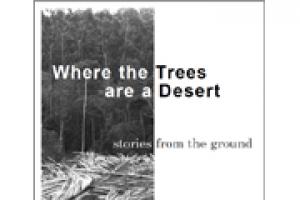On 8 March, a major mobilization took place on Route BR-101 North in the Brazilian State of Espirito Santo, in the locality of São Mateus. Coinciding with International Women’s Day, and with numerous women participants, close on 600 Tupinikim and Guarani indigenous people, representatives of the Quilombos (Afro-Brazilian communities) and members of the Landless Rural Workers Movement (the well-known MST) and of the Small Farmers’ Movement (MPA, a member of the Via Campesina), occupied the highway and halted traffic.
Large-Scale Tree Plantations
Industrial tree plantations are large-scale, intensively managed, even-aged monocultures, involving vast areas of fertile land under the control of plantation companies. Management of plantations involves the use of huge amounts of water as well as agrochemicals—which harm humans, and plants and animals in the plantations and surrounding areas.
Bulletin articles
11 March 2004
Bulletin articles
11 March 2004
The Plantation 2020 Vision (The Federal Government's programme aimed at establishing 650,000 hectares of tree plantations in Tasmania over the next twenty years - see WRM Bulletins Nº 37, 55, 64) draws upon and extends Tasmania's violent history of dispossession, when the fate of the indigenous population was to be elbowed out of the way by Europeans.
Other information
11 March 2004
The United Nations Framework Convention on Climate Change (UNFCCC) has been in force since 21 March 1994. For a decade, international climate change negotiators have filled meeting rooms with hot air. Meanwhile, greenhouse gas emissions have increased by 11 per cent, according to World Resources Institute.
Yet when more than 5,000 participants descended on Milan for the ninth Conference of the Parties to the UNFCCC (COP-9) in December 2003, reducing greenhouse gas emissions was not on the agenda.
Bulletin articles
12 February 2004
In 2002, the Malaysian organization Tenaganita, together with Pesticide Action Network-Asia Pacific launched a study that confirmed that women plantation workers were being poisoned by the use of highly toxic pesticides, especially paraquat.
At the launching of the "Study of Pesticides Poisoning in the Plantations", Tenaganita Director, Dr. Irene Fernandez said that “If the Malaysian government had, through its enforcement agencies the Department of Occupational Safety and Health and the Pesticides Board, effectively implemented the laws the women would not have suffered."
Bulletin articles
12 February 2004
The invisibility of women is perhaps nowhere greater than in timber plantations. Few women are ever seen working within the endless rows of eucalyptus or pine trees. But plantations are very visible to women, who are in fact greatly impacted by them in different ways.
Other information
13 January 2004
Industrial tree plantations have a long history of negative social and environmental impacts. It was therefore felt that there was a clear need to raise the issue in a specific workshop at the World Social Forum. Participants shared their experiences from a broad range of countries.
Bulletin articles
13 December 2003
A wide range of stakeholders from environment and community groups, research bodies and decision-makers from government and industry came together in Nelspruit, South Africa in mid-November to discuss a burning issue - the impact of timber plantations.
Bulletin articles
13 December 2003
On 1 December 2003, SmartWood suspended the Forest Stewardship Council certification of two of Forest Industry Organisation’s teak plantations. SmartWood is accredited by FSC to assess whether forestry operations conform to FSC’s principles for well managed forests or plantations.
Bulletin articles
13 December 2003
The Plantar forestry company located in the State of Minas Gerais has large eucalyptus plantations in the zone, established at the expense of evicting the local populations. They were also established at the expense of the typical forest in the zone (the “cerrado”), and the trees were converted into charcoal to supply the iron and steel industry and replaced by eucalyptus, planted for the same objective.
Bulletin articles
13 December 2003
On 12 December, the Matte (CMPC companies), Angelini (Arauco) forestry groups and a number of Chilean and US environmental NGOs signed an agreement (see http://www.wrm.org.uy/countries/Chile/article2.html ) whereby the companies have agreed to conserve the areas of native forest existing on their properties – representing 2.8% of the total surface of the native forests in the country – and not replace them by tree plantations.
Bulletin articles
13 December 2003
In 1998, the author Joe Broderick finished his research on the Smurfit Carton de Colombia company, publishing his book “El imperio de cartón: impacto de una multinacional papelera en Colombia” (The Cardboard empire: the impact of a multinational paper company in Colombia). In this book he provides details of the serious social and environmental impacts caused by the activities of a branch of the Irish transnational company, Jefferson Smurfit in that country.
Other information
30 November 2003
By Carbon Trade Watch, TNI/FASE
This collaorative brieing gives an insight into the history of monoculture eucalyptus plantations inBrazil and their impacts on local people and the environment. It also explores the new finances made available by the World Bank that allows the expansion of these destructive plantations through the carbon market.
Download full document here

